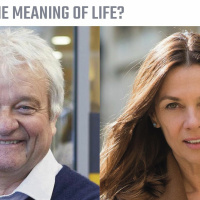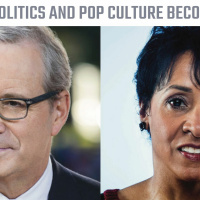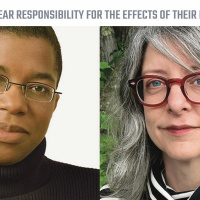Sinopsis
An innovative blend of ideas journalism and live events.
Episodios
-
What Is The Meaning of Life?
10/05/2021 Duración: 56min“I intend to live forever, or die trying,” said Groucho Marx. Distinguishing between life and its end may be easy for comedians, even immortal ones. But the task has proven surprisingly hard for biologists, who know too much about nature’s bewildering diversity. Modern science, for all its breakthroughs, has yet to produce a standard definition for life. What does it mean to be alive—and how have our answers to that question evolved over time? What roles do cells, genes, evolution, chemistry, and information play in determining life? And what does it really mean to create and protect life in our age of apocalypse and artificial intelligence? Sir Paul Nurse—Nobel Laureate, director of the Francis Crick Institute in London, and author, most recently, of What Is Life?—visited Zócalo to discuss the search for the meaning of life. This event was moderated by Magdalena Zernicka-Goetz, Caltech developmental biologist and author of “The Dance of Life.” This Zócalo/CaltechLive! event was part of the CaltechLive! “
-
How Did Politics and Pop Culture Become One? at Zócalo Public Square
23/04/2021 Duración: 59minThe Atlantic senior editor Ronald Brownstein, author of the new book Rock Me on the Water: 1974- The Year Los Angeles Transformed Movies, Music, Television, and Politics, visits Zócalo to examine the complicated relationship between pop and politics. Tonight’s online event is moderated by Sandy Banks, columnist at the Los Angeles Times. Read more about our panelists here: https://zps.la/3cjL6OA For live captioning, please turn on the video’s caption feature. Visit https://www.zocalopublicsquare.org/ to read our articles and learn about upcoming events. Follow along on Twitter: https://twitter.com/thepublicsquare Instagram: https://www.instagram.com/thepublicsquare/ Facebook: https://www.facebook.com/zocalopublicsquare LinkedIn: https://www.linkedin.com/company/z-calo-public-square
-
Do Inventors Bear Responsibility for the Effects of Their Inventions?
13/04/2021 Duración: 46minEvery year scientists who have made great inventions receive Nobel Prizes recognizing their “benefit to humankind.” Yet for all the profound ways scientific progress has impacted our lives, many inventions have affected the world in ways that their creators did not imagine. Some innovations, created for peaceful purposes, have been used in war; others have had unintended environmental or health effects. More recently, the seemingly beneficial blue LED light has been found to interrupt sleep patterns and make roadways unsafe for senior drivers. What is it like to be an inventor? Are inventors responsible for the societal ramifications of their creations? And how could a more holistic approach to innovation lead future scientists to create change with fewer unintended consequences? Ainissa Ramirez, a scientist who did research at Bell Labs before writing “The Alchemy of Us: How Humans and Matter Transformed One Another,” and Issues in Science and Technology senior editor Lisa Margonelli visited Zócalo to discu
-
How Do Our Cities Prepare for the Post-Apocalypse?
07/04/2021 Duración: 01h02minZócalo and the University of Toronto present The World We Want, an event series exploring our current societal, political, and economic challenges and how we might emerge from the current moment. The series includes “How Do Our Cities Prepare for the Post-Apocalypse?” It’s too late to prevent the apocalypse. Because it’s already here. A virus spreads globally, creating a pandemic, as yet uncontrolled. Climate change accelerates, and hurricanes, droughts, heat waves, and floods grow deadlier. Nuclear weapons and disruptive technologies proliferate, and economic dislocation and record mass migrations destabilize cities. Is it reasonable to expect urban centers, which are particularly threatened by many of these global phenomena, to do much more than mitigate the damage? And if world-altering disasters—from climate change to mass social breakdown—are inevitable, what can we do now to give our densest and most vulnerable communities a better chance of recovering from these apocalypses, and perhaps even thriving
-
Does Power Dressing Have the Power to Change Politics?
19/03/2021 Duración: 01h28sA new, bold generation of women leaders is ascending in America. They haven’t entirely ditched the pantsuit, but they have embraced eye-catching colors, up-and-coming designers, and statement-making clothes and accessories. Which means these women have also opened themselves up to the risks—and rewards—inherent in such choices. This past election cycle had no shortage of iconic fashion moments, from Vice President Kamala Harris accepting victory in suffragist white to Michelle Obama's "VOTE" necklace (by Los Angeles designer BYCHARI) going viral. Meanwhile, the fashion industry itself is being called on to take stronger political stances and right wrongs, past and present, particularly when it comes to issues of race, labor, and gender. Are we entering a new era of intertwined fashion and politics—and if so, what does it mean for these industries and institutions, and for the rest of us? What can the history of women and fashion in the political arena teach us about the perils and potential of statement-makin
-
What Does ‘Food Security’ Really Mean?
16/03/2021 Duración: 46minGlobal security depends on everyone having enough food. Scientist Molly Jahn started her career inventing squashes and melons. But that work led her to wonder and worry about the security of our global food supply in the face of changing climate, growing population, and new forms of war. What does “food security” really mean in the 21st century? Why hasn’t food security been a bigger part of national security debate and planning? And what would you do if you realized, as Jahn did, that the long-term food security of the nation was not assured and that no one at the highest level of government was working on the problem? Jahn, who is now at the U.S. Defense Advanced Research Projects Agency (DARPA), and Issues in Science and Technology editor-in-chief Daniel Sarewitz visited Zócalo to discuss the possible paths to a future where food enough for all is assured. For a full report of the program, check out the Takeaway: http://zps.la/3ePH70M Visit https://www.zocalopublicsquare.org/ to read our articles and le
-
Can We All Become Conservationists?
10/03/2021 Duración: 47minOver the last 500 years, 755 animal species and 123 plant species have gone extinct. One species can take primary responsibility for this mass annihilation: homo sapiens. From hunting and fishing to factories and farming, humans (with the assistance of diseases and other natural disasters) have managed to decimate large swaths of the planet. But beginning in the late 18th century, one group of people has managed to slow, and in some cases even reverse, the disappearance of many endangered species. From William T. Hornaday—the first director of the Bronx Zoo—to Rachel Carson—who helped launch the environmental movement—conservationists have fought an uphill battle to protect animals and habitats around the world. What drives humans to save species—some majestic (bison and bald eagles) but others decidedly less charismatic (desert tortoises and perch)? What lessons can we learn from conservationists, past and present, as we confront the growing threat of climate change to all species? Science journalist Miche
-
Can Women’s Movements Save the World?
10/03/2021 Duración: 59min2020 was the year that women emerged indisputably as the world’s most successful leaders, from Taiwan President Tsai Ing-wen and New Zealand Prime Minister Jacinda Ardern’s COVID responses to German Chancellor Angela Merkel saving the eurozone and minimizing damage from Brexit. But perhaps more important was the growing success of transnational feminist movements. For more than a decade, networks of women have been sharing resources, media know-how, and strategies across mass movements. Now this transnational work is producing policy breakthroughs and societal shifts, including greater protections for survivors of sexual violence in Guatemala, more reproductive rights and legalized abortion in Chile and Argentina, the decriminalization of homosexuality in India, a crackdown on sexual harassment in South Korea, and the Greta Thunberg-inspired youth movement for stronger climate response everywhere. What is next for these movements, especially in many Middle Eastern and African countries, where progress for wom
-
What Does a Feminist Foreign Policy Look Like?
03/03/2021 Duración: 59minMen have been running the free world since men invented the term “free world.” But from the success of Jacinda Ardern and Angela Merkel at combating the pandemic to the ascension of Kamala Harris to the White House, women are demonstrating their strength as leaders more visibly than ever before. And over the past seven years, Sweden, Canada, France, Luxembourg, and Mexico all have adopted or pledged to implement what they call a “feminist foreign policy.” To that end, these nations have sought to place gender and women’s advancement at the center of every diplomatic decision, from trade agreements to treaty alliances, and from foreign aid to ambassadorial appointments. For these countries, feminist foreign policy also has had costs, including in diminished trade with nations like Saudi Arabia. What can the U.S. learn from countries that have adopted an explicitly feminist foreign policy? How might such a policy change America’s positions and priorities on climate change, migration, and military intervention,
-
Has California Ended Mass Incarceration?
25/02/2021 Duración: 01h01minBetween 1975 and 2007, incarceration rates in the United States increased nearly fivefold. But over the last decade, California has slowly turned away from mass incarceration, reducing its prison population and changing criminal sentencing and other law enforcement practices to give more people more second chances. What has California done right in this transformation, and where has it fallen short? How are criminal justice system reforms changing our economy, our schools, our housing markets, our health systems, and our politics? And what would a truly just criminal justice system look like? UC Berkeley public policy professor Steven Raphael visited Zócalo to examine criminal justice reform in California and how ending mass incarceration might change our communities. This Zócalo/California Wellness Foundation online event was moderated by Abbie VanSickle, California reporter at The Marshall Project. Co-Presented with UC Center Sacramento. Read more about our panelists here: https://zps.la/3cjL6OA For
-
Is It Time to Consider Lincoln More Critically?
17/02/2021 Duración: 51minSurely, every debate about Abraham Lincoln has been had, and every story told—from his childhood splitting rails and his battle with depression to his cabinet of former rivals and his assassination. Yet over 150 years after Lincoln’s death, new details about Honest Abe still emerge to surprise us—and even stir up some contemporary controversy. A new exploration of a little-known 1864 episode shines a light on Lincoln's authoritarian side and his manipulative relationship with the press. With the Union mired in a bloody war with no end in sight, two New York newspapers published a presidential proclamation declaring an unpopular new draft. Lincoln declared it a forgery and shut down both outlets, threatening and imprisoning telegraph operators, editors, and reporters. But ultimately, there was more truth to the proclamation than Lincoln admitted, and the real culprits were never brought to justice. What lessons can this history teach us about the relationship between politics, media, and national security in t
-
What Would a New Cold War Mean for the World?
12/02/2021 Duración: 01h06minZócalo and the University of Toronto present The World We Want, an event series exploring our current societal, political, and economic challenges and how we might emerge from the current moment. The series continued with “What Would a New Cold War Mean for the World?” Civilization faces existential threats—pandemics, climate change, nuclear proliferation, runaway technologies—that seem to require international collaboration. Meanwhile, China and the United States are engaging in greater conflict with each other, and embracing unilateralism in matters of trade, technology, national security, and the sovereignty of their neighbors. To what extent will nations, businesses, NGOs, and individuals across the globe have to take sides if the U.S.-China contest becomes a new Cold War? What are the perils of the bitter competition between China and the West over 5G networks and artificial intelligence? And is it possible to create a collaborative and resilient international order to solve big problems, or are we head
-
What Does Kamala Harris’s Rise Say About America?
05/02/2021 Duración: 46minThe inauguration of Kamala Harris was a moment of many firsts—the first woman, the first Black woman, the first woman of color, the first person of South Asian heritage, even the first California Democrat to become vice president. But this moment has been punctuated by an eruption of hatred and violence, and further evidence of America's bitter divisions, making it difficult to celebrate Harris's rise as evidence of national progress. How has the country shifted over the past four years—and over the course of Harris's career—to make her election possible? What does the elevation of a career prosecutor mean at a moment when many Americans want the criminal justice system to be less punitive? And how well is the vice president positioned to help change American attitudes about race, gender, diversity, and representation? The veteran California journalist Dan Morain, author of the new biography “Kamala’s Way,” and Kimberly Peeler-Allen, co-founder of Higher Heights, an organization building the collective politi
-
Can Local Media Restore Trust and Destroy Disinformation?
23/01/2021 Duración: 01h03minSocial media polarizes us. Political propaganda deluges us. And misinformation and disinformation seem to spread as quickly as COVID-19. So where can we go to find stories, analysis, and messengers we can trust? Scholars say that high-quality, fact-based local news organizations—based in our own communities and staffed by diverse and responsible journalists who are also our neighbors—can inoculate us against the toxicity that inundates us via screen, airwave, and print. But such local media are dying; more than a quarter of the country’s newspapers have closed in this century, and thousands of communities no longer have their own news outlets. So how can local, community-based information messengers be made viable again—and how do we know that they are committed to being part of the solution rather than contributing to the problem? What strategies and institutions are already working to restore the trust in information, and in one another, that provides the foundation of a healthy civil society? American Jou
-
How Will Robot Trucks Change American Life? Live on Twitter: Steve Viscelli and Lisa Margonelli
20/01/2021 Duración: 40minRobotic trucks are beginning to roll out, carrying cargo and promises of revolutionizing freight hauling, reducing traffic, and lowering pollution. But previous waves of automation have eliminated millions of jobs in the United States. And a transformation in truck driving could come with big costs for the 3.5 million truckers who toil in one of America’s most enduring occupations and play an outsized role in our nation’s economy and road-heavy culture. Will driverless trucks become cramped and lonely “sweatshops on wheels” maintained by poorly paid attendants? What would it take to make this highly visible shift to automation serve society by creating good new jobs, making roads safer, and even helping the planet? University of Pennsylvania sociologist and former truck driver Steve Viscelli, author of The Big Rig: Trucking and the Decline of the American Dream, and Issues in Science and Technology senior editor Lisa Margonelli rolled into Zócalo to consider how automated trucking might transform American l
-
Can Higher Education Be Transformed to Better Serve Society?
15/01/2021 Duración: 01h02minAmerica’s higher education system faces a crisis of legitimacy. Colleges and universities, while promoting themselves as forces for social mobility, have stacked the deck against their neediest students. Rising college costs, skyrocketing student debt, and increasingly out-of-touch curricula are leading more Americans to question the fairness and value of higher education. What is right, and what misses the mark, in these mounting critiques of our colleges and universities? Can institutions be forced to make sweeping changes to tuition structures, endowment spending, and affirmative action—or are these changes destined to produce more conflict? And what would it take for higher education to transform itself to better serve society? Arizona State University President Michael Crow, co-author of The Fifth Wave: The Evolution of American Higher Education, Pomona College President G. Gabrielle Starr, and California State University Chancellor Joseph Castro visited Zócalo for an in-depth discussion of how to make
-
What Would Society Look Like Without Police?
11/12/2020 Duración: 01h54sZócalo and the University of Toronto present The World We Want, an event series exploring our current societal, political and economic challenges and how we might emerge from the current moment. The series began with “What Would Society Look Like Without Police?” All over the world, law enforcement violence and corruption have reignited anti-racism movements that seek the reform and defunding of police—or even their outright abolition. Advocates of defunding the police say it would open up possibilities for addressing social challenges, from improving mental health and developing more sustainable neighborhoods and economies to repairing the damage from centuries of discrimination and state violence. How would such a transfer of resources play out, especially in communities with a highly visible police presence? Who would replace police in their core work of emergency response, violence prevention, and crime investigation? What would it mean for a 21st-century society to dismantle, or even eliminate, its poli
-
Can Innovation Really Solve Society’s Problems?
08/12/2020 Duración: 47minSince World War II, the United States has famously funded research to advance all fields of science and innovation. The resulting wave of discovery and knowledge has benefited Americans by creating new disease-fighting drugs, increasing economic productivity, and sparking an information revolution through advances like the internet and GPS. Yet not everyone has benefited from innovation equally, and our society remains bedeviled by a host of problems—from healthcare disparities to income inequality and structural racism. Can discovery and invention really fix the entrenched inequities and deep divisions that ail America? What does it take to create society-changing leaps forward in innovation and technology? Two experts in American innovation—former DARPA director Arati Prabhakar, who is now CEO/founder of the nonprofit Actuate, and Issues in Science and Technology editor-in-chief Daniel Sarewitz—visited Zócalo to consider the promise and pitfalls of innovation as the nation attempts to emerge from one of the
-
What Are Today’s L.A. Women Fighting For?
30/11/2020 Duración: 01h05minOne hundred years after the passage of the 19th Amendment, Zócalo and the Natural History Museum of Los Angeles County present When Women Vote, a three-event series that concluded with “What Are Today’s L.A. Women Fighting For?” Women have made Los Angeles one of the nation’s most progressive cities, fighting for their own rights as well as those of children, laborers, immigrants, and other underrepresented groups since well before they gained the right to vote over 100 years ago. The city, which has the lowest gender pay gap of any American metropolis, has been a leader in creating policies designed to create wealth for working-class women in particular, from passing legislation to create the country’s first public bank to raising the minimum wage. But women in Los Angeles—particularly lower-income and Black and brown women—still face a number of challenges, including health disparities, housing struggles, and human trafficking. What battles are the women of Los Angeles fighting today, and what are the plan
-
Why Is It So Easy To Get Away with Murder?
17/11/2020 Duración: 38minIf you commit murder in the United States, there’s a 40 percent chance you’ll get away with it. That shocking statistic belies other realities; you have better than even odds of getting away with murder if you kill people who are poor, powerless, or non-white, or if you do your murdering in less wealthy and developed places. Why are Americans willing to tolerate such widespread failure to achieve justice for murder victims? To what extent are the nation’s social problems and inequalities reflected in how authorities seek to prevent and investigate homicide? And what are the costs and consequences of this widespread impunity for families, communities, cities, and the country as a whole? BuzzFeed News West Coast investigations editor Jessica Garrison, author of The Devil’s Harvest: A Ruthless Killer, a Terrorized Community, and the Search for Justice in California’s Central Valley, visited Zócalo to examine the American way of murder through the case of Jose Martinez, who killed three dozen people over three



















